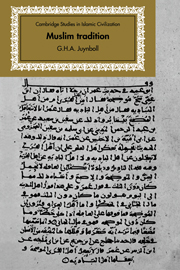Book contents
- Frontmatter
- Contents
- Preface
- Note to the Reader
- Introduction
- 1 A tentative chronology of the origins of Muslim tradition
- 2 The role of qāḍīs in the spreading of traditions
- 3 The man kadhaba tradition and the prohibition of lamenting the dead. An investigation into mutawātir traditions
- 4 An appraisal of muslim ḥadīth criticism. Rijāl works as depositories of transmitters' names
- 5 ‘Accepting traditions means knowing the men’
- Appendix I
- Appendix II
- Appendix III
- Appendix IV
- Appendix V
- Bibliography
- Index (glossary)
- Frontmatter
- Contents
- Preface
- Note to the Reader
- Introduction
- 1 A tentative chronology of the origins of Muslim tradition
- 2 The role of qāḍīs in the spreading of traditions
- 3 The man kadhaba tradition and the prohibition of lamenting the dead. An investigation into mutawātir traditions
- 4 An appraisal of muslim ḥadīth criticism. Rijāl works as depositories of transmitters' names
- 5 ‘Accepting traditions means knowing the men’
- Appendix I
- Appendix II
- Appendix III
- Appendix IV
- Appendix V
- Bibliography
- Index (glossary)
Summary
The five chapters of this book were written during the years 1976–81. Some of them were presented in condensed form at various conferences, colloquia and seminars. The reactions and criticisms they evoked have been incorporated where appropriate. Thus Chapters 2 and 4 were read at UEAI congresses held respectively in Aix-en-Provence (1976) and Amsterdam (1978). Chapter 2 was also introduced at a SOAS seminar in London in 1977 as well as at a seminar organized by the Institute for Advanced Studies of the Hebrew University in Jerusalem, where, during a year's stay (1979–80), I had the opportunity to discuss also Chapter 3 and 4.
When researching this book I greatly benefited from a number of persons and institutions whose suggestions and help I should like to acknowledge with gratitude.
First of all, I am thankful to I. R. Netton and J. N. Mattock for proposing corrections of my English style.
My year's stay at the Institute for Advanced Studies in Jerusalem, on the invitation of M. J. Kister and S. Shaked, proved a wonderful opportunity to write most of Chapters 1 and 5.
Leiden University Library's excellent Oriental collection, made available especially through the good offices of A. J. W. Huisman and J. J. Witkam, was indispensable.
- Type
- Chapter
- Information
- Muslim TraditionStudies in Chronology, Provenance and Authorship of Early Hadith, pp. ixPublisher: Cambridge University PressPrint publication year: 1983

